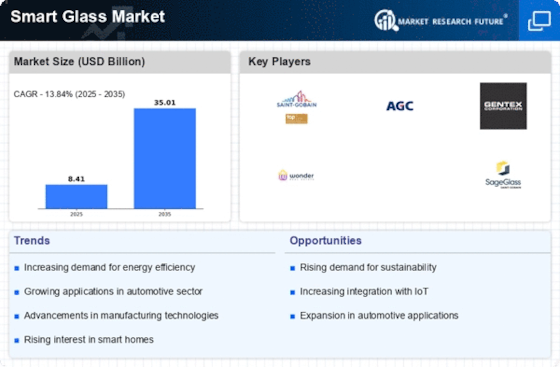Top Industry Leaders in the Smart Glass Market

Competitive Landscape of Smart Glass Market:
The global smart glass market is experiencing significant growth, driven by advancements in technology, increasing awareness of its benefits, and expanding applications across diverse industries. This burgeoning landscape presents a dynamic competitive environment with established players, emerging startups, and diverse technology approaches vying for market share.
Key Players:
- Force Impact Technologies INC. (US)
- Ericsson(Sweden)
- Honeywell International Inc. (US)
- DAQRI, LLC(US)
- Unaliwear Inc. (US)
- Huawei Technologies Co. Ltd. (China)
- General Electric Company(US)
- Fitbit Inc. (US)
- Revolar Inc. (US)
- ADT Inc. (US)
- Safelet B.V. (The Netherlands)
- Kore Wireless Group (US)
- 100Plus Inc (US)
- Skully(Georgia)
- MC David Inc. (US)
- PORTER (India)
- SVOR(France)
- Pestel(US)
Strategies Adopted:
- Product Differentiation: Players are focusing on developing unique functionalities and features to differentiate themselves in the market. This includes incorporating advanced sensors, integrating smart assistants, and offering customizable solutions for specific applications.
- Strategic Partnerships: Collaboration with technology providers, architects, and construction companies allows established players to leverage expertise, expand reach, and access new markets. Emerging companies often leverage partnerships with established players to gain access to distribution channels and overcome initial market entry barriers.
- Research and Development: Continuous investment in research and development is crucial for staying competitive in the rapidly evolving smart glass market. Companies are focusing on developing cost-effective manufacturing processes, improving energy efficiency, and exploring new materials and technologies like suspended particle devices (SPD) and electrochromic smart glass.
- Market Expansion: Players are actively expanding their geographical presence to capitalize on emerging markets with high growth potential. This includes establishing manufacturing facilities, setting up distribution networks, and tailoring product offerings to local market requirements.
Factors for Market Share Analysis:
- Technology Type: The market is segmented by technology type, with SPD currently holding the largest market share due to its mature technology and cost-effectiveness. However, electrochromic smart glass is expected to witness significant growth due to its superior optical properties and energy efficiency.
- Application: The automotive and architectural sectors are the primary drivers of smart glass demand. However, emerging applications in healthcare, transportation, and consumer electronics are expected to contribute significantly to market growth.
- Regional Market: Asia Pacific is expected to be the fastest-growing market due to rapid urbanization, government initiatives, and increasing demand for smart buildings. North America and Europe are also mature markets with significant growth potential.
New and Emerging Companies:
Several new and emerging companies are entering the smart glass market with innovative technologies and niche product offerings. These companies are focusing on developing smart glass solutions for specific applications, such as:
- Automotive head-up displays: Gauzy and Oculii are developing head-up display systems for cars that project information onto the windshield, improving driver safety and comfort.
- Smart windows for buildings: Polytronix is developing energy-efficient smart windows that can adjust their tint based on the sun's position and ambient temperature, reducing energy consumption and improving occupant comfort.
- Smart wearables: Companies like Innovega and North are developing smart glasses that integrate augmented reality (AR) technology for entertainment, gaming, and industrial applications.
Current Investment Trends:
- Venture capitalists and private equity firms are increasingly investing in smart glass startups, recognizing the potential of the market and its disruptive potential across various industries.
- Major technology companies like Google, Apple, and Facebook are also investing in smart glass research and development, indicating the growing interest in this technology for future applications.
- Governments are also providing funding and support for research and development initiatives in the smart glass sector, recognizing its potential for energy efficiency, sustainability, and economic growth.
Latest Company Updates:
September 2023 - Meta Smart Glasses in association with Ray-Ban has been launched lately together with Meta Quest 3 & other products. The users can easily livestream videos to Instagram and Facebook utilizing the smart glasses, hands-free. Its frame has a 12-megapixel camera sensor & an LED unit. This new smart wearable succeeds the stories of Ray-Ban that were the foremost smart glasses of the company and had been released during 2021 September. Unlike VR/AR headsets, however, the meta smart glasses from Ray-Ban does not have any display unit.
September 2023 - Amazon and Italy’s Safilo have of late revealed that they will soon come up with latest smart glasses that are Carrera-branded that employs Alexa technology & will be sold within the US market. They both stated that these new glasses will offer the wearer up to 6 hours constant media playback or constant talk time that too on full battery charge. The glasses will direct sound to the wearer’s ears sans covering them and also at the same time minimize what other people can hear. Safilo is immensely proud in cooperating on this wonderful project with Amazon.
April 2023 - A Delhi-based private hospital has recently joined hands with Bengaluru-based SHG Technologies & Vision Aid India for introducing AI-powered smart glassed that will aid the visually impaired. These smart vision glasses come with ML and AI technology which helps the device in identifying the indoor and outdoor objects and offer walking and reading assistance through voice alerts and proximity sensors.










